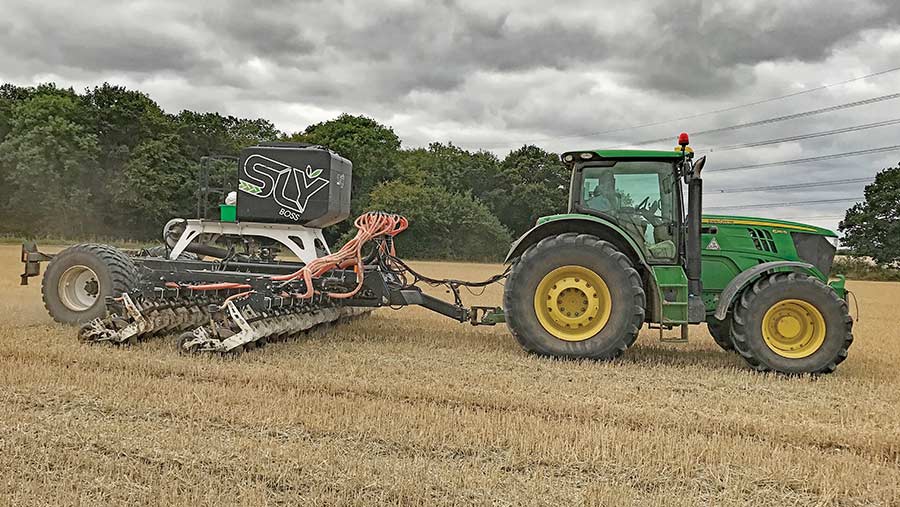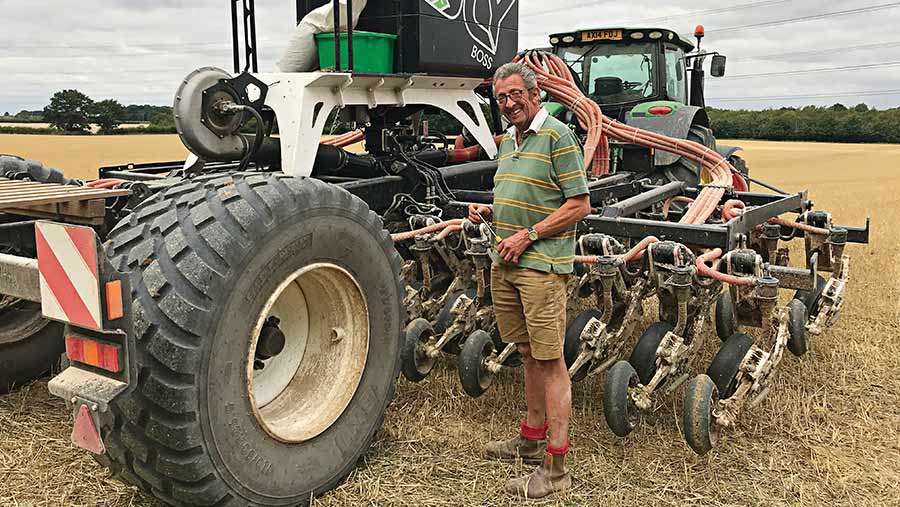Direct drills revisited: 6m Sly/Horizon Boss
 6m Sly/Horizon Boss © James Andrews
6m Sly/Horizon Boss © James Andrews Swithin Waterer was one of the first UK growers to purchase a Sly (now Horizon) Boss angled disc drill and he’s still using it six years on.
The 6m Australian-inspired seeder was drafted in to replace a 3m Mzuri Pro-Til, which itself had taken over from the Essex farm’s conventional plough, cultivation, power harrow and tine drill system.
His hope was that it would allow him to cover the 400ha arable area he farms in partnership with a couple of neighbours more efficiently, as well as reducing blackgrass pressure and improving soil structure.
See also: Driver’s view: Swithin Waterer’s Sly Boss drill

Swithin Waterer © James Andrews
Sly Boss (2017)
- Width/coulter spacing 6m/167mm
- Coutlers Angled disc/240kg
- Hopper 1,200 litre
- Price paid £77,500
On the whole, it’s been a success, with soil conditions improving and yields holding up.
The ability to travel at speeds of 9-11kph also means it can cover the ground quickly, and fuel use of the John Deere 6210R pulling it ranges from just 7-9 litres/ha.
In good autumn conditions, the angled disc coulter delivers consistent results, tucking the seed neatly into the friable soil.
However, in stiffer, wetter ground, the rear rubber wheel can struggle to close the slot, meaning a pass with the Cambridge rolls is sometimes required to consolidate the ground.
The effect on blackgrass populations has been difficult to judge, but he reckons there has been a slight improvement over the six years.
Cultivation work still necessary
Although the drill has helped improve the workability and organic matter content of the soil and increased worm populations, cultivation work is still required.
Slumping has always been a problem with the farm’s mixed topsoils over chalky boulder clay, so all land gets lifted with a five-leg, 3m TWB low-disturbance subsoiler every threeor four years.
Working directly into stubbles on heavier ground in the spring has also proved problematic, as the soil tightens up over winter and there’s lack of tilth for seeds to be drilled into.
To combat this, they work ground with a Kockerling cultivator in the autumn, which weathers over winter to create a decent seed-bed that they can sow directly.
It’s no good working the drill straight into newly cultivated ground though, as the discs tend to skid; it needs to be well consolidated first, so that they have something to bite into.
Incorporated straw has been another challenge, as the chopper on their John Deere T560 combine wasn’t initially set up to give a fine enough chop or sufficiently even spread pattern.
This led to some poor performing strips in second wheats.
“Last spring, we asked Dick Neale from Hutchinsons to investigate and – after digging several test pits – he concluded that the problem was allelopathic activity on the unevenly distributed straw and chaff breaking down, rather than the drill,” says Swithin.
Adding an extra bar into the chopper to give a finer cut and altering spreading settings has dramatically improved the situation.
“On his advice we have also purchased a straw rake to spread and even out the chaff and chopped straw, helping to initiate its early breakdown, as well as reducing the slug population.”
Poor performance in the wet
Another limitation has been the drill’s performance in sticky conditions.
One of the issues is that wet soil gets wedged between the rubber tyres and rims of the front press cleaning wheel.
This then distorts the tyre so that it fails to clean the disc and a build-up of soil occurs which stops it turning properly.
He’s been told by Horizon that tyres on the latest drills uses stiffer rubber which prevents the problem.
Also, mud can collect on the rear closing and depth wheels so that they no longer effectively close the slot.
Horizon has now moved to a knobbly metal depth closing wheel, which Swithin understands should be more effective at pushing soil back over the seed, particularly in sticky conditions.
Likes and gripes
Likes
- Covers ground quickly
- Excellent seed placement in good conditions
- Low establishment costs
- Strong construction
Gripes
- Depth and press wheels don’t always close slot
- Poor performance in wet
- Discs are expensive
- Hard to drill beans deep enough
